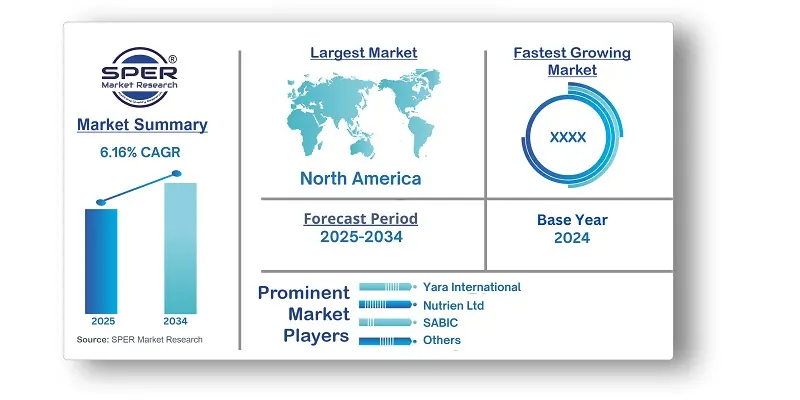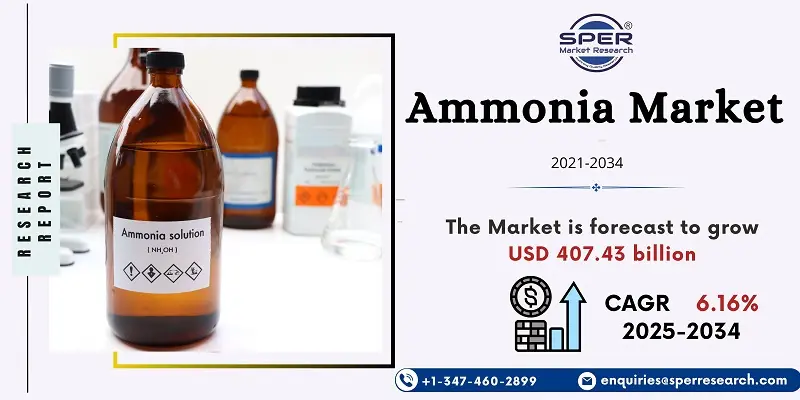
Ammonia Market Size, Trends, Growth Drivers, CAGR Status, Demand and Future Outlook
Ammonia Market Growth, Size, Trends Analysis - By Product, By Application - Regional Outlook, Competitive Strategies and Segment Forecast to 2034
| Published: Feb-2025 | Report ID: CHEM2505 | Pages: 1 - 229 | Formats*: |
| Category : Chemical & Materials | |||


- In April 2024, JERA and CF Industries will consider forming a joint venture to build a low-carbon ammonia factory with a capacity of 1.4 million metric tons. JERA is exploring purchasing 48% ownership of the project and intends to acquire approximately 500,000 metric tons of low-carbon ammonia per year to meet Japan's demand for low-carbon fuel.
- In March 2024, Yara formed a partnership with GHC SAOC, an Acme Cleantech subsidiary. Acme will supply Yara with ammonia produced with lower CO2 emissions as part of this partnership. The arrangement includes the delivery of 100,000 tons of renewable ammonia per year.
| Report Metric | Details |
| Market size available for years | 2021-2034 |
| Base year considered | 2024 |
| Forecast period | 2025-2034 |
| Segments covered | By Product, By Application. |
| Regions covere | North America, Latin America, Asia-Pacific, Europe, and Middle East & Africa. |
| Companies Covered | Acron, Yara International, BASF SE, CF Industries Holdings, Inc, Koch Fertilizers, LLC, Mitsui Chemicals, Inc, Nutrien Ltd, Qatar Fertiliser Company, SABIC, Sumitomo Chemical Co, Ltd. |
- Global Ammonia Market Size (FY’2021-FY’2034)
- Overview of Global Ammonia Market
- Segmentation of Global Ammonia Market By Product (Aqueous, Anhydrous)
- Segmentation of Global Ammonia Market By Application (Fertilizers, Refrigerants, Pharmaceuticals, Textile)
- Statistical Snap of Global Ammonia Market
- Expansion Analysis of Global Ammonia Market
- Problems and Obstacles in Global Ammonia Market
- Competitive Landscape in the Global Ammonia Market
- Details on Current Investment in Global Ammonia Market
- Competitive Analysis of Global Ammonia Market
- Prominent Players in the Global Ammonia Market
- SWOT Analysis of Global Ammonia Market
- Global Ammonia Market Future Outlook and Projections (FY’2025-FY’2034)
- Recommendations from Analyst
1.1. Scope of the report1.2. Market segment analysis
2.1. Research data source
2.1.1. Secondary Data2.1.2. Primary Data2.1.3. SPERs internal database2.1.4. Premium insight from KOLs
2.2. Market size estimation
2.2.1. Top-down and Bottom-up approach
2.3. Data triangulation
4.1. Driver, Restraint, Opportunity and Challenges analysis
4.1.1. Drivers4.1.2. Restraints4.1.3. Opportunities4.1.4. Challenges
5.1. SWOT Analysis
5.1.1. Strengths5.1.2. Weaknesses5.1.3. Opportunities5.1.4. Threats
5.2. PESTEL Analysis
5.2.1. Political Landscape5.2.2. Economic Landscape5.2.3. Social Landscape5.2.4. Technological Landscape5.2.5. Environmental Landscape5.2.6. Legal Landscape
5.3. PORTERs Five Forces
5.3.1. Bargaining power of suppliers5.3.2. Bargaining power of buyers5.3.3. Threat of Substitute5.3.4. Threat of new entrant5.3.5. Competitive rivalry
5.4. Heat Map Analysis
6.1. Global Ammonia Market Manufacturing Base Distribution, Sales Area, Product Type6.2. Mergers & Acquisitions, Partnerships, Product Launch, and Collaboration in Global Ammonia Market
7.1. Aqueous7.2. Anhydrous
8.1. Fertilizers8.2. Refrigerants8.3. Pharmaceuticals8.4. Textile
9.1. Global Ammonia Market Size and Market Share
10.1. Asia-Pacific
10.1.1. Australia10.1.2. China10.1.3. India10.1.4. Japan10.1.5. South Korea10.1.6. Rest of Asia-Pacific
10.2. Europe
10.2.1. France10.2.2. Germany10.2.3. Italy10.2.4. Spain10.2.5. United Kingdom10.2.6. Rest of Europe
10.3. Middle East and Africa
10.3.1. Kingdom of Saudi Arabia10.3.2. United Arab Emirates10.3.3. Qatar10.3.4. South Africa10.3.5. Egypt10.3.6. Morocco10.3.7. Nigeria10.3.8. Rest of Middle-East and Africa
10.4. North America
10.4.1. Canada10.4.2. Mexico10.4.3. United States
10.5. Latin America
10.5.1. Argentina10.5.2. Brazil10.5.3. Rest of Latin America
11.1. Acron
11.1.1. Company details11.1.2. Financial outlook11.1.3. Product summary11.1.4. Recent developments
11.2. Yara International
11.2.1. Company details11.2.2. Financial outlook11.2.3. Product summary11.2.4. Recent developments
11.3. BASF SE
11.3.1. Company details11.3.2. Financial outlook11.3.3. Product summary11.3.4. Recent developments
11.4. CF Industries Holdings, Inc
11.4.1. Company details11.4.2. Financial outlook11.4.3. Product summary11.4.4. Recent developments
11.5. Koch Fertilizers, LLC
11.5.1. Company details11.5.2. Financial outlook11.5.3. Product summary11.5.4. Recent developments
11.6. Mitsui Chemicals, Inc
11.6.1. Company details11.6.2. Financial outlook11.6.3. Product summary11.6.4. Recent developments
11.7. Nutrien Ltd
11.7.1. Company details11.7.2. Financial outlook11.7.3. Product summary11.7.4. Recent developments
11.8. Qatar Fertiliser Company
11.8.1. Company details11.8.2. Financial outlook11.8.3. Product summary11.8.4. Recent developments
11.9. SABIC
11.9.1. Company details11.9.2. Financial outlook11.9.3. Product summary11.9.4. Recent developments
11.10. Sumitomo Chemical Co., Ltd
11.10.1. Company details11.10.2. Financial outlook11.10.3. Product summary11.10.4. Recent developments
11.11. Others
SPER Market Research’s methodology uses great emphasis on primary research to ensure that the market intelligence insights are up to date, reliable and accurate. Primary interviews are done with players involved in each phase of a supply chain to analyze the market forecasting. The secondary research method is used to help you fully understand how the future markets and the spending patterns look likes.
The report is based on in-depth qualitative and quantitative analysis of the Product Market. The quantitative analysis involves the application of various projection and sampling techniques. The qualitative analysis involves primary interviews, surveys, and vendor briefings. The data gathered as a result of these processes are validated through experts opinion. Our research methodology entails an ideal mixture of primary and secondary initiatives.



Frequently Asked Questions About This Report
PLACE AN ORDER
Year End Discount
Sample Report
Pre-Purchase Inquiry
NEED CUSTOMIZATION?
Request CustomizationCALL OR EMAIL US
100% Secure Payment






Related Reports
Our Global Clients
Our data-driven insights have influenced the strategy of 200+ reputed companies across the globe.




















